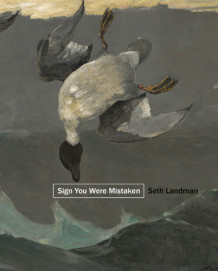 Seth Landman
Seth Landman
Factory Hollow Press ($15)
by Will Wlizlo
Sign You Were Mistaken begins with a provocation, an impish poem that pokes and prods throughout the rest of the book:
What makes you think
every little thing of you
can be what makes you
everything that lasts forever?
Answering—or the attempt to answer—this inquiry is at the heart of Seth Landman’s collection of slim free verse and brassy prose poems. In just the opening volley, he confronts themes of cognition, perspective, individuality, agency, and posterity, which is a sure sign the answer is complicated.
The speaker of these poems is preoccupied with the boundaries of places both familiar and unfamiliar to him. While one poem might witness him “go atlas / and study the wide world in wonder,” more often than not he can be found “on sofas dreaming of sofas” or otherwise safe within the walls of a comfortable apartment. These poems are domestic, but not for commentary on retiling a bathroom floor or raising children. Rather, their concern is the difficulty in understanding, defining, and securing one’s home in the ever-expanding universe—feathering one’s existential nest.
The recurring interior/outside dichotomy foregrounds the tension and allure of the unexplored world, the lands beyond the walls of familiar experience. Lines like “Massachusetts stretches out / in the night but I can’t see it / do that, which is called scale” accentuate the smallness of the human body and mind, as well as the curiosity that nevertheless encourages exploration of the big unknown. They are both exuberant in their daring and unapologetic in their repose.
While travelling between realms, Landman by extension also comments on the relationship between one’s introspection and the environment of other ideas from which self-reflection separates itself: “When it feels terrible in the interior, maps call the outside into view. I pour over them for hours, never leaving my kitchen. Finally, I am unfamiliar with my own house.” This, too, is a kind of fraught domesticity, albeit an intellectual one. One imagines Landman lounging on the plush furniture of his consciousness, wrapping himself in a threadbare emotional bathrobe, coveting his neighbor’s well-manicured moral lawn. How much of one’s place in existence is purely psychological? he seems to ask. And what does it mean for a home to be intangible?
If there is one glaring omission from this collection, it is its lack of a social aspect. For all his excursions out of the house, Landman rarely shoots the breeze with his neighbor, so to speak. The reader learns little about the other individuals residing in their own apartments-in-the-universe, the strangers who’ve populated the galaxy of ideas—and how other private and public lives interact with the speaker’s.
By juxtaposing a house and its surrounding universe to symbolize individual experience and the extent of possible experience, Landman calls attention to the inauthenticity of comparison. “It’s dawn and dawn can be / a ship,” he writes, implicitly suggesting dawn can also be an antique chandelier. Or a longing. Or—why not?—a spiritual awakening. If a symbol functions as a sign for interpretive guidance, then perhaps this collection’s title is a rejection or reconsideration of symbolism’s utility.
Thus, Landman employs challenging syntax in some of these poems to avoid watering down complex ideas with symbolism and figurative language. By liberally appending the word “the” before idiosyncratic feelings, circumstances, and relationships, he transforms nuance to “simple” nouns. Phrases like “the here I am, hours early, as always,” “the I am thinking about the suits of travelers,” “the were I mine and tender,” “the that you are my sister / and you entertain me in my strangeness,” and “the is it, what is it, what” are evocative, but certainly defy an easy read. The last example in particular gets at Landman’s poetic vision: the “what” (or, better, “the what”) of his poems is an unruly collection of experiences—gathered, but not necessarily connected; overwhelming, but not necessarily overbearing; telling, but not necessarily narrative. This list-crafting technique makes for a difficult yet differently honest attempt to classify, clarify, and interpret both interior and exterior phenomena.
Upon revisiting the collection’s introductory poem, it’s possible to judge whether Landman has answered his own vexing question. Bearing in mind his ongoing examination of “the what” of human experience, his response might simply be a reiteration of the opening poem, except with one major difference: the question mark would be replaced by a full stop.

